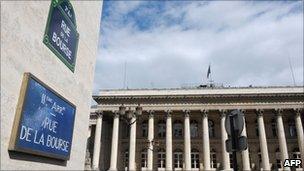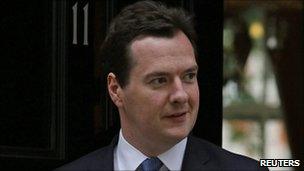Are markets bonkers?
- Published
- comments

Shares in French banks have fallen amid concerns that France faces a credit downgrade
Are lenders to government, creditors of banks and investors in shares behaving in the kind of way that would guarantee them the kind of losses that presumably they would wish to avoid?
Are they completely bonkers, in other words?
I ask this question, because there is something of a paradox about investors' and creditors' current obsession with whether huge economies - the US, Italy, Spain and latterly France - will be able to repay all their debts.
The natural reaction of the governments of these countries, when they fear that it will become harder and more expensive for them to borrow, is to do what they think their creditors want - which is to introduce austerity measures, to reduce their respective deficits, the gap between what they spend and their tax revenues.
So Italy is accelerating plans to cut its deficit, the US is initiating a deficit-reduction plan for the first time since the crash of 2007-8 (albeit something of a messy one) and France is trying to make its deficit-cutting promises more credible (President Sarkozy last night gave his ministers a week to formulate new deficit-reduction measures).
Now here's the thing.
With economic growth in the developed Western economies so weak, these austerity measures are convincing investors and creditors (the same ones who don't want to lend to Italy and Spain, or different ones?) that the risk of a slide back into recession has become larger.
So guess what? They sell shares in companies that would be hurt most by recession, especially banks.
And some of them also start to wonder whether it's credible that Italy, Spain and so on will really be able to reduce their deficits, if an economic slowdown reduces what they receive in tax revenues.
Insurance hike
It is highly relevant in that context that the price which investors have to pay to insure their loans to Spain and Italy through the credit default swap market rose back to the kind of levels we saw before the European Central Bank started buying up Spanish and Italian government bonds.
And the cost to insure French government debt also rose sharply yesterday.

On Thursday the chancellor will address MPs on the state of the UK economy
What that means is that creditors see the intrinsic risks of lending to these countries as elevated - and they fear the ECB buying of Italian and Spanish sovereign debt is an artificial and possibly unsustainable measure to reduce these countries' borrowing costs.
Against this backdrop, George Osborne is bound to argue today that the growing doubts about whether the US, Spain, Italy and latterly France can repay all their debts - which has been the backdrop to the rout on stock markets over the past 10 days - shows it is important that he should not waver from his deficit reduction measures, his austerity plan.
The chancellor will say that the UK has benefited greatly from lower borrowing costs as a result of the cuts, because it has retained its triple-A credit rating.
The problem for him - and the paradox of the current crisis, as I've pointed out - is that the austerity that is now being forced on other countries, like Italy, the US and France, means that the probability of the world sliding back into recession has increased.
So the shadow chancellor, Ed Balls, will argue that the chancellor's alleged inflexible determination to cut UK public spending increases the risk of a return to recession here.
This argument - whether the greater risk is countries unable to repay their debts or recession - is causing intense debate in politics and mayhem on markets.
Belief in banks
Where it becomes a matter of life and death, in financial and economic terms, is in respect of its impact on banks and the banking system.
Because there is an inextricable link between creditors' confidence in big banks and creditors' confidence in the public finances of their respective home countries (see my post of last night for more on this).
The transmission mechanism between the perceived quality of sovereign debt and the perceived quality of bank debt goes like this.
First, all big banks benefit from an implicit guarantee from the governments of their domicile that they'll be bailed out in a crisis: it is the too-big-to-fail guarantee that George Osborne has asked the Independent Commission on Banking to find some way of weaning banks off (to an extent).
So the weaker the public finances of the government standing behind a bank, the less valuable is that too-big-to-fail guarantee - and the harder and more expensive it therefore becomes for that bank to borrow.
Given that the UK's banks are bigger relative to the size of the economy than those of any other country (except Switzerland), this link between a government's credit rating and the perceived strength of banks is one reason why the chancellor is so keen for the UK to keep its AAA rating.
Second, banks are encouraged by regulators to hold large stocks of government bonds, because these are seen as easily convertible into cash in a crisis.
But what is a safety buffer when public finances are in good shape becomes a source of serious weakness as and when the credit-worthiness of the issuers of those bonds, the borrowing governments, is challenged.
If in a worst case, as has happened for Greece, there is an agreement that the sovereign borrower won't pay back all it owes, there is a double whammy for banks.
They incur a loss that disproportionately reduces the capital they hold as a protection against losses on other loans, because under international banking rules they don't have to hold any capital in relation to their loans to alleged stronger economies.
Or to put it another way, if you are an investor who thinks that over the longer term there's a fair chance that a number of sovereign borrowers will fail to repay all they owe, then you would argue that the balance sheets of every big bank in Europe and the US are significantly weaker than the published figures show.
That is the background for the rout in Italian shares a week ago - and for the plunge in the shares of French banks yesterday. There has, inevitably, been contagion to UK bank shares.
Here's a chilling statistic: the share prices of Royal Bank of Scotland and Lloyds are more than 50% below what taxpayers paid for their huge stakes in these banks at the height of the banking crisis at the end of 2008.
PS. There has been a bounce in European shares this morning, following last night's slide on Wall Street. But given the volatility of the past fortnight, anyone who tells you they know where the market will close tonight is a fool or a knave.